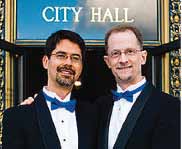 Over the last few weeks, our community and allies have made an irrefutable case to the United States Supreme Court for the freedom to marry nationwide and full equality under the Constitution for LGBT people. In addition to the powerful briefs the plaintiff couples filed in the cases, the Court received over 70 amicus (or friend of the court) briefs supporting equality. Marriage Equality USA filed one of those amicus briefs. We encourage readers to look at all the briefs; below are some highlights of the brief MEUSA filed with the Court.
Over the last few weeks, our community and allies have made an irrefutable case to the United States Supreme Court for the freedom to marry nationwide and full equality under the Constitution for LGBT people. In addition to the powerful briefs the plaintiff couples filed in the cases, the Court received over 70 amicus (or friend of the court) briefs supporting equality. Marriage Equality USA filed one of those amicus briefs. We encourage readers to look at all the briefs; below are some highlights of the brief MEUSA filed with the Court.
Empowering LGBTQ people to tell their own stories and to advocate in their own voices has always been a central mission of MEUSA. In our brief, LGBT couples across the country, from Florida to Iowa to Oregon, reveal how discrimination has harmed them and how equality has brought them personal dignity and legal protections that they had never had before.
Voices include an LGBT couple in their 90s, who for 70 years told no one of their relationship until they decided to marry; a young LGBT couple, raising four children, who had been unable to live together as a family because of their home state’s law that excludes same-sex couples from marrying—marriage equality coming to their state meant that they could finally live together as a family; an LGBT couple who married in California where they made their home for years, but when the Great Recession hit needed to move to live with family in a state without equality. In the process, that former California couple lost not just their jobs and their home, but they also lost full recognition and respect from others for their marriage.
A central theme of our brief is that Americans’ right to marry and to have their government accord them the highest respect and recognition for their relationship should derive inherently from their humanity and not the particularities of their gender, gender identity or sexual orientation. The brief also stresses the importance of the freedom to marry and LGBT equality being federal constitutional rights, enforceable in all 50 states and all U.S. territories. When we do not have equal rights wherever we go in the country, we are deprived of part of our identity as members of the national community to which we are entitled as Americans.
The voices in the brief also describe how the dignity that the freedom to marry instills in LGBT Americans is not just the pride of getting married, but the dignity that our government is finally treating us as equal human beings as LGBT people, something many of us had never experienced before. In the brief, Leigh Hessel recounts her wedding in California to her longtime partner Candace Krueger and describes: “As we took our marriage vows and exchanged our rings, we realized that we had never thought these words would ever apply to us as lesbians. Finally, they did…We and our community had finally arrived. ”
That dignity is incomplete unless LGBT people receive the same measure of respect in every way in which they interact with the government. Being able to marry does little for an LGBT state employee if their state can turn around and fire them as soon as they say, “I do.” It does little for a family, headed by LGBT parents, if their home state that grants them a marriage license can deny them joint adoption of their child.
This year’s landmark cases present the Supreme Court with the opportunity to say once and for all that the liberty and equality guarantees of the Fourteenth Amendment to the Constitution extend fully to LGBT Americans. In its decision holding that so-called “sodomy” laws were unconstitutional, the Supreme Court described how those who drafted the Fourteenth Amendment knew that “time can blind us to certain truths, and later generations can see that laws once thought necessary and proper, in fact, serve only to oppress. As the Constitution endures, persons in every generation can invoke its principles in their own search for greater freedom.”
With the briefs filed before the Supreme Court, our community and allies raise our voices collectively to invoke the principles of the Constitution in this generation. Together, we look to the Supreme Court to fulfill the Fourteenth Amendment’s promise of liberty and equality not only for this generation, but also for generations to come.
The Supreme Court will hold oral arguments in the marriage equality cases on April 28, with a decision expected by the end of June.
You can read MEUSA’s brief here: http://tinyurl.com/nno5o2h
All of the briefs are available here: http://tinyurl.com/oxpzlzc
Stuart Gaffney and John Lewis, together for three decades, were plaintiffs in the California case for equal marriage rights decided by the California Supreme Court in 2008. They are leaders in the nationwide grassroots organization Marriage Equality USA.
Recent Comments